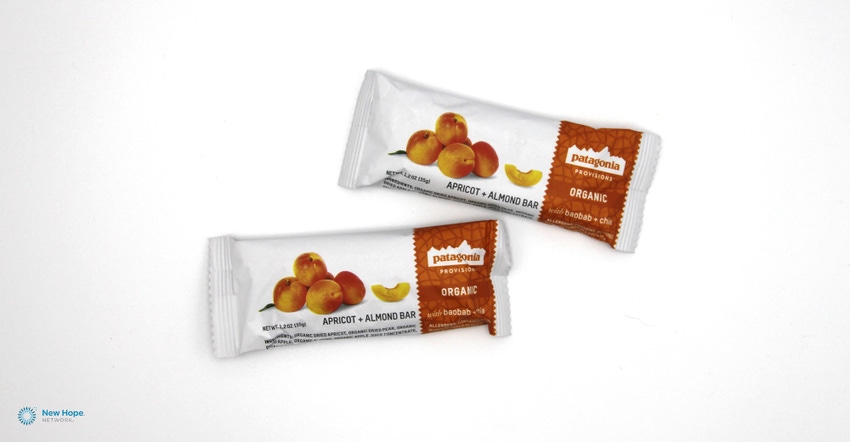Patagonia Provisions builds markets for soil-building crops, not the other way around
Managing Director Birgit Cameron explains the company's mission to demonstrate how the agri-food industry has the potential to be part of the solution to the environmental crisis.
July 1, 2019

Patagonia Provisions, the food arm of the outdoor clothing pioneer, has made some splashes in recent years, for product innovation as well as supply chain sustainability. That’s no coincidence—the company was founded specifically with the intention to build markets for sustainably and regeneratively produced food. This week, at the Outdoor Retailer show, the company won Popular Mechanics Editor’s Choice Outdoor Retailer 2019 Award for its salmon and Best of Outdoor Retailer 2019 for its fruit + nut bars. We talked with Patagonia Provisions Managing Director Birgit Cameron about the company’s mission and business model.
Tell us about Patagonia Provisions’ mission, and how the company came to be.
Birgit Cameron: The food industry is one of the biggest industries on earth and a massive contributor to global warming. Most of our food is produced using methods that reduce biodiversity, decimate soil and contribute to climate change. Yet food done differently holds a special potential not only to reduce our negative impacts on the planet, but to reverse them entirely. That’s why Patagonia started a food business. We believe our food can and should be a part of the solution to the environmental crisis, grown in ways that restore our land, water and wildlife. Healthy soil, in particular, is an amazing machine we can harness to reduce existing pollution through carbon sequestration.
While food is a new direction for Patagonia, it’s always been a keen interest of Yvon Chouinard, who believes agriculture has the potential to be part of the solution to the environmental crisis—and so the mission of Provisions is in fact the same mission we’ve always followed at Patagonia.
We’re in business to save our home planet. Founded by Yvon Chouinard in 2012, Patagonia Provisions offers ethically and sustainably sourced food products out of its Sausalito, California-based headquarters. A certified B-Corporation, the company is recognized for reexamining best practices in food sourcing, utilizing regenerative organic growing methods and working with like-minded advocates and producers to find solutions to the important environmental issues facing the food industry.
How is that going as a business model?
BC: It is going really well—the business is growing steadily. One of the things we are most excited about to date is the work we’ve put into the Regenerative Organic Certification. Industrial food production damages the earth in multiple ways: through over use of chemicals, the reduction of biodiversity, putting GMOs in the food supply, loading food with antibiotics, etc., and all the while, our food production system is also one of the biggest contributors to climate change. Regenerative Organic Certification (ROC) is a tool to change all of this, and one we suggest every single brand in the food (and apparel) space consider joining in on.
I also wanted to mention that we don’t make decisions based off of current trends in the marketplace but rather based on what matters most to us from a sustainability and regeneration standpoint. That’s a lesson we have learned from 40+ years of making apparel, and one that we would love to see other brands follow. We make products that illustrate how to solve problems.
Does Patagonia Provisions plan to reduce consumer prices, and how?
BC: We price our products based on the cost of organic, regenerative ingredients and as a result of paying the farmers and other people who make our food possible fairly. We actually feel that food, in general, is underpriced and doesn’t actually represent its true cost. Therefore, we don’t have plans to reduce prices. In the agricultural business, the wrong crops are being subsidized and are altering the true cost of food. As such, we are working to help revisit policy to help move price and cost in a more accurate direction moving forward. We’re working with OTA, and with Avi Garbow, former EPA General Counsel, to identify folks in the political community to start to address some of these issues. It’s a long road, but it’s certainly something we are planning.
What’s on the horizon for increasing distribution or scale?
BC: We do have plans to continue to scale sustainably. In 2018, we were in 90 stores. In 2019, we are in nearly 1,000 stores, and anticipate another 1,000 by next spring. The main expansion is in places like REI, Whole Foods Market, Erewhon and Fresh Market. Our online is growing as well. We have a new fish, mackerel, that will launch in the fall; something in the baked goods category coming out, possibly by Natural Products Expo next year, or maybe sooner; some new bars; and a spicy mango in the works. It’s a nice variety of things.
About the Author(s)
You May Also Like




